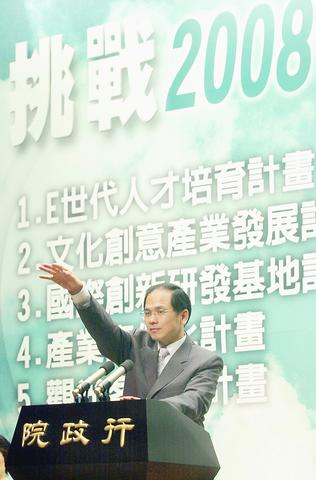Some of the nation's top business leaders yesterday voiced strong support for the Cabinet's NT$2.6 trillion six-year national development project, aimed at turning Taiwan into a "green silicon island" -- a nation devoted to clean high-tech industries.
Morris Chang (
"I'm particularly impressed with the talent cultivation plan, because it's important to build a first-rate talent pool in the era of the knowledge-based economy," he said.

PHOTO: CHIANG YING-YING, TAIPEI TIMES
Stan Shih (
"It's such a good plan that the government should consider publicizing it more," he said.
Premier Yu Shyi-kun yesterday pledged to implement the project to the full after the Cabinet approved the plan.
"I'm well aware that the goals we set down are high, but we're determined to do our best to reach them, as I have confidence in the country, the Taiwanese people and the government," Yu said.
The government hopes that implementation of the project will help create 700,000 new jobs, spur Taiwan's economy to grow from the current 2.3 percent to 5 percent, decrease the unemployment rate from the current 5 percent to 4 percent and have research and development expenses take up 3 percent of GDP.
In addition, the Cabinet hopes the project will help develop at least 15 products or technologies that will rank among the world's best, double the current number of foreign tourists from 1 million to between 2 million and 5 million and increase the household use of broadband Internet services to 6 million homes.
While Vice Premier Lin Hsin-Yi (
Hu Sheng-cheng (
Chen Chi-nan (
Lin Sheng-feng (
Tsai Ching-yen (蔡清彥) is to supervise the implementation of plans to digitize Taiwan and Kuo Yao-chi (郭瑤琪), head of the Cabinet's Public Construction Commission, will oversee the nationwide mass transportation network plan.
Likening the introduction of the project to the birth of a child, Yu said he is happy to see the project come into being after 76 rounds of discussion and revision.
"We hope that with the implementation of the project, we'll be able to upgrade Taiwan's quality of life and lessen the gap between Taiwan and other developed countries," he said.

The manufacture of the remaining 28 M1A2T Abrams tanks Taiwan purchased from the US has recently been completed, and they are expected to be delivered within the next one to two months, a source said yesterday. The Ministry of National Defense is arranging cargo ships to transport the tanks to Taiwan as soon as possible, said the source, who is familiar with the matter. The estimated arrival time ranges from late this month to early next month, the source said. The 28 Abrams tanks make up the third and final batch of a total of 108 tanks, valued at about NT$40.5 billion

Two Taiwanese prosecutors were questioned by Chinese security personnel at their hotel during a trip to China’s Henan Province this month, the Mainland Affairs Council (MAC) said yesterday. The officers had personal information on the prosecutors, including “when they were assigned to their posts, their work locations and job titles,” MAC Deputy Minister and spokesman Liang Wen-chieh (梁文傑) said. On top of asking about their agencies and positions, the officers also questioned the prosecutors about the Cross-Strait Joint Crime-Fighting and Judicial Mutual Assistance Agreement, a pact that serves as the framework for Taiwan-China cooperation on combating crime and providing judicial assistance, Liang

A group from the Taiwanese Designers in Australia association yesterday represented Taiwan at the Midsumma Pride March in Melbourne. The march, held in the St. Kilda suburb, is the city’s largest LGBTQIA+ parade and the flagship event of the annual Midsumma Festival. It attracted more than 45,000 spectators who supported the 400 groups and 10,000 marchers that participated this year, the association said. Taiwanese Designers said they organized a team to march for Taiwan this year, joining politicians, government agencies, professionals and community organizations in showing support for LGBTQIA+ people and diverse communities. As the first country in Asia to legalize same-sex

MOTIVES QUESTIONED The PLA considers Xi’s policies toward Taiwan to be driven by personal considerations rather than military assessment, the Epoch Times reports Chinese President Xi Jinping’s (習近平) latest purge of the Chinese People’s Liberation Army (PLA) leadership might have been prompted by the military’s opposition to plans of invading Taiwan, the Epoch Times said. The Chinese military opposes waging war against Taiwan by a large consensus, putting it at odds with Xi’s vision, the Falun Gong-affiliated daily said in a report on Thursday, citing anonymous sources with insight into the PLA’s inner workings. The opposition is not the opinion of a few generals, but a widely shared view among the PLA cadre, the Epoch Times cited them as saying. “Chinese forces know full well that